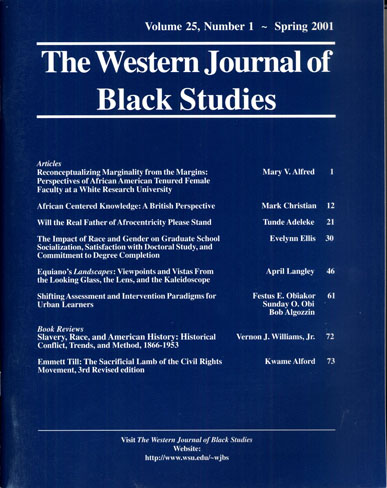Volume 25, Issue 1
Reconceptualizing Marginality from the Margins: Perspectives of African American Tenured Female Faculty at a White Research University
Mary V. Alfred
The concept of marginality is often used to describe individuals and groups who are situated outside the margins of the majority culture. Traditional social science literature portrays the marginal individual as subordinate, outsider; deficient, and she is often seen as a victim of her society. This article presents a more positive conceptualization of marginality, one drawn from the perspectives of five African American female faculty members at a predominantly white research university and from the writings of other African American scholars. Findings from the research reveal that the women positively defined their marginal status in White dominated institutions. This reconceptualization was manifested through positive self-definition, Black cultural identity, having a safe space to escape oppressive forces, and by rejecting externally constructed definitions of their Black womanhood.
pp. 1–11
African Centered Knowledge: A British Perspective
Mark Christian
This article examines the impact of African centered knowledge primarily within the perspective of Britain. Over the last decade there has been a major development in African Diaspora studies that have forged links between various "Black Atlantic" communities. In Britain there has been a profoundly positive grassroots response to the work of African centered scholars' such as Molefi Asante, Marimba Ani, William E. Nelson, Jr., Maulana Karenga, John Henrik Clarke, Ivan Van Sertima and many others. This has occurred mainly via conferences organized by community and educational activists based in Liverpool, London, Manchester, Leeds and Sheffield. However, within the walls of the British academy, Afrocentric perspectives have largely encountered negative, selective and superficial criticism; writers such as Paul Gilroy and Stephen Howe are prime examples of this form of critique. In short, this paper intends to clarify some of the key aspects of African centered knowledge that are prevalent in Britain, along with assessing the contemporary criticisms of it.
pp. 12–20
Will the Real Father of Afrocentricity Please Stand
Tunde Adeleke
Afrocentricity has its roots deeply buried in the struggles of nineteenth century African American intellectuals against the aristocratic historiography that shaped western conception of the African/Black historical experience from the dawn of enslavement. As this paper has shown, though living in a world that shaped a contradictory consciousness, historically speaking, Blacks, who were bombarded with negative images and stereotypes of self-denigration, and socialized to self-abase and affirm European superiority, developed a combative consciousness that unsettled and challenged ingrained Eurocentric values. It is this alienatory consciousness that inspired the Afrocentric paradigm. It is, however important not to loose sight of the utilitarian foundation of the Afrocentric paradigm, its anti-establishment character notwithstanding.
pp. 21–29
The Impact of Race and Gender on Graduate School Socialization, Satisfaction with Doctoral Study and Commitment to Degree Completion
Evelynn Ellis
The study investigates experiences of Black and White doctoral students at a predominantly White research institution to determine if differences in doctoral student socialization, satisfaction with doctoral study, and commitment to degree completion exist based on the students 'race or gender. The study found that race and gender do impact socialization, satisfaction level, and commitment to degree completion. More specifically, Black doctoral women in the study appeared to be affected more by race than were the Black men, White men and women. Based on these findings, the investigator offers some suggestions for administrators who wish to address some of the issues raised by the participants in this document.
pp. 30–45
Equiano's Landscapes: Viewpoints and Vistas from the Looking Glass, the Lens, and the Kaleidoscope
April Langley
For "notable black American travelers," such as Equiano, the experience of Benin (Africa) preceded the experience of England (Europe) whether real or imagined. Thus, eighteenth-century African American writers like Equiano were as conscious of national and racial identity constructions as are twentieth-century literary scholars in as much as their "African" consciousness was influenced by indigenously derived African ways of knowing and integrated into the literature of this period. Equiano 's Interesting Narrative evidences the use of indigenously-derived remnants of African ontologies and epistemologies in both form and content, with the engagement of race, class, and gender using Igbo narrative theories, such as chi in Igbo Cosmology and its complementary duality discourse on African ways of knowing.
PP. 46–60
Shifting Assessment and Intervention Paradigms for Urban Learners
Festus E. Obiakor, Sunday O. Obi, and Bob Algozzine
Multidimensional issues confront those who live in urban communities and, to a large extent, they are reflected in problems experienced by many urban learners, in schools, these concerns include consistently inappropriate identification, assessment, placement, and instruction as a result of racial, cultural, and socio-economic backgrounds. Identification, assessment, and instructional practices for urban students must be multidimensional to address individual differences and build self-concepts. The goal must be to maximize the fullest potential of students who look behave, learn, and speak differently. In this article, we examine the issues faced by urban learners in general and special education programs. Specifically, we discuss traditional identification, assessment, and intervention concerns that consistently magnify difficulties of learners and suggest ways to ameliorate these problems.
pp. 61–71
Book Reviews
Slavery, Race, and American History: Historical Conflict, Trends, and Method, 1866–1953
Author: John David Smith
Reviewed By: Vernon J. Williams, Jr.
p. 72
Emmett Till: The Sacrificial Lamb of
the Civil Rights Movement, 3rd Revised Edition
Author: Clenora Hudson-Weems
Reviewed By: Kwame Alford
pp. 73–74

| The WJBS site is normally maintained by Tanya Gonzales. Please feel free to e-mail comments, queries, and suggestions. |
Heading using the h3 tag
Lorem ipsum dolor sit amet, consectetur adipisicing elit, sed do eiusmod tempor incididunt ut labore et dolore magna aliqua. Ut enim ad minim veniam, quis nostrud exercitation ullamco laboris nisi ut aliquip ex ea commodo consequat. Duis aute irure dolor in reprehenderit in voluptate velit esse cillum dolore eu fugiat nulla pariatur. Excepteur sint occaecat cupidatat non proident, sunt in culpa qui officia deserunt mollit anim id est laborum.